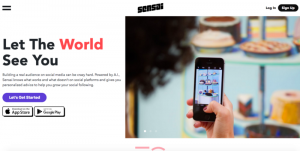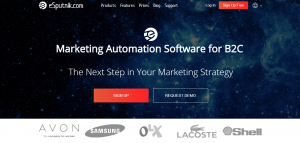
As soon as Artificial Intelligence (AI) entered the scene, it became a hot topic. Businesses are widely embracing AI technologies such as Machine Learning, which simplifies the workflow for marketers in so many ways and offer a myriad of benefits. Many hotel chains, e-commerce companies, airlines, and brick-and-mortar stores didn’t think twice about whether to use AI to provide better service to their customers while increasing revenue.
Face recognition, Voice assistants like Siri, Alexa, and Cortana, smart selfies, and Augmented Reality – the ways in which AI is used to offer innovative features and easy solutions for everyday tasks has revolutionized the digital world and shaped web and mobile markets. Amazon and Netflix are already leveraging Machine Learning to market to specific customers.
Handset manufacturers are actively upgrading their phones with dedicated AI processors. The latest Samsung Galaxy, Google Pixel, and Apple iOS devices all contain special hardware designed to handle AI-based tasks more efficiently. This capability was in only 3% of phones in 2017 but will be in approximately 35% of all mobile devices sold next year.
 What Does AI Mean for Mobile Marketing?
What Does AI Mean for Mobile Marketing?
AI is rapidly conquering the mobile market and changing the way users interact with their phones. However, the ones who will benefit from AI technology the most are marketers.
Every Marketing Manager’s job is to identify customers’ needs and deliver a product that meets them. Mobile devices – mainly mobile phones – collect data on people’s behavior AI automates the analysis of that data, providing previously unavailable insights that give a better understanding of customers’ needs.
With the help of Machine Learning algorithms, Marketing Managers can precisely target their audiences and not scatter their efforts on irrelevant leads. Mobile apps themselves are incredibly important for businesses because they boost Engagement, Conversions, and Sales. And AI tools make promotions easier and more effective compared to old-fashioned methods where everything had to be done manually such as launching Marketing campaigns and sending emails.
Thanks to AI tools, marketers can offer users more personalized advertisements without frustrating them with irrelevant and intrusive banners that result in a negative user experience and decreased customer loyalty.
Types of AI-Based Software for Mobile Marketers
In this article, we’ll look at AI tools that are widely used by mobile marketers. There are a lot of tasks AI can help with. In general, AI-powered tools fall into the following categories:
- Analytics
- Content Management
- Ad Optimization
- Customer Service
- Email Marketing
- Social Media management
Analytics Tools
This category of tools, as the name implies, does all the analytical stuff. They processe massive amounts of data and predict customers’ next actions nased on the past decisions and choices. This allows marketers to design tailor-made campaigns based on their customers’ current needs without dealing with terabytes of information manually.
Some analytics tools help marketers maintain a personal connection with customers and create a sensible outreach plan for different audiences. Other tools give marketers insights into competitors’ activities.
Interactive dashboards in these tools allow marketers to judge how well their campaigns are performing and see which methods are most successful.
 There are also platforms that provide Social Marketing insights and data-driven recommendations. They allow me of these platforms is Sensai, which works on popular platforms like Instagram and Twitter. Sensai allows marketers to design better messaging for social media.
There are also platforms that provide Social Marketing insights and data-driven recommendations. They allow me of these platforms is Sensai, which works on popular platforms like Instagram and Twitter. Sensai allows marketers to design better messaging for social media.
Content Management
These tools are all about grammar and spelling. AI-powered grammar tools can spare marketers from embarrassment. Usually, such tools have multi-platform support, allowing them to make suggestions content in emails, on social media, and in text editors. Thanks to Machine Learning, they can provide accurate suggestions based on the context.
 A perfect example of such a tool is Grammarly. This app helps users write better thanks to its sophisticated grammar and contextual spelling checkers. In addition, Grammarly provides short explanations for every correction and checks punctuation.
A perfect example of such a tool is Grammarly. This app helps users write better thanks to its sophisticated grammar and contextual spelling checkers. In addition, Grammarly provides short explanations for every correction and checks punctuation.
Ad Optimization Tools
One of the greatest features of ad optimization tools is their ability to manage all ad campaign data in one place. That’s in addition to their ability to build customized workflows and provide Machine Learning recommendations across platforms.
However, the main reason for the popularity of ad optimization tools is that they allow marketing managers to track how much money is spent on ad campaigns.
Another type of ad optimization tool automates the creation of targeted ads. These tools use AI to generate relevant ideas for new content. SEO tools also can check whether similar content already exists on the web to avoid plagiarism.
 For example, the Scoop.it app helps professionals manage all content they publish for different clients in one centralized application. This content management feature also allows marketers to immediately publish posts to different online channels, while an integrated AI engine provides a constant stream of ideas for new campaigns.
For example, the Scoop.it app helps professionals manage all content they publish for different clients in one centralized application. This content management feature also allows marketers to immediately publish posts to different online channels, while an integrated AI engine provides a constant stream of ideas for new campaigns.
Customer Service Tools
AI-powered customer service tools take care of all communications with customers with the help of intelligent chatbots. Chatbots greet visitors of websites or social media pages and encourage them to take some action. This way, audiences won’t just take a look at the content and leave but will stay to learn more about the product or service you’re promoting.
Customer service tools provide lots of templates for different business needs, and AI helps them build up all sorts of chat scenarios based on customer needs.
 The name of one of these helpers is Dialogflow. It’s offered by the same company that created Assistant, a virtual buddy for Android, iOS, and Windows smartphones. The company behind Dialogflow is well versed in human/computer interaction technologies. It uses Machine Learning to learn from visitors and offer personalized dialogs in response to their inquiries.
The name of one of these helpers is Dialogflow. It’s offered by the same company that created Assistant, a virtual buddy for Android, iOS, and Windows smartphones. The company behind Dialogflow is well versed in human/computer interaction technologies. It uses Machine Learning to learn from visitors and offer personalized dialogs in response to their inquiries.
Email Marketing Tools
These tools are like magic wands for managing overloaded email inboxes. Machine Learning apps help to automate and control email campaigns so that inboxes don’t pile up with unanswered messages. Tools that deal with emails can identify the most important contacts and send them targeted follow-ups. They also help marketers personalize messages for different groups of customers.
 As AI-powered tools continuously adapt and learn from customer responses, they gain an understanding of individual audience members and can provide one-on-one interactions. eSputnik.com is a great example of an email management tool. It uses twelve different AI models, including models to personalize recommendations, build segments based on personas, optimize the send time for emails, and generate content. eSputnik undertakes the most part of the marketing tasks and automate such processes as starts of marketing campaigns and mailouts.
As AI-powered tools continuously adapt and learn from customer responses, they gain an understanding of individual audience members and can provide one-on-one interactions. eSputnik.com is a great example of an email management tool. It uses twelve different AI models, including models to personalize recommendations, build segments based on personas, optimize the send time for emails, and generate content. eSputnik undertakes the most part of the marketing tasks and automate such processes as starts of marketing campaigns and mailouts.
Social Media Management Tools
AI-powered tools that specialize in social media management provide insights into how brands or products are performing across the most popular social media platforms. Machine Learning algorithms can predict customers’ needs by analyzing their social media habits. According to these observations, AI can suggest the most viable Marketing strategies and assist in creating ad campaigns. Another feature of social media management tools lets marketers monitor requests, reposts, and likes across platforms.
 For instance, Cortex makes recommendations to Marketing teams based on customers’ social media behavior. This application can build a social publishing calendar to which specific hashtags and keywords can be added. Cortex can also provide information regarding a competitor’s social media efforts.
For instance, Cortex makes recommendations to Marketing teams based on customers’ social media behavior. This application can build a social publishing calendar to which specific hashtags and keywords can be added. Cortex can also provide information regarding a competitor’s social media efforts.
Wrapping Up
As you can see, AI-powered tools can simplify and speed up the work of the Marketing department. AI transforms a massive amount of data into useful insights and helps to enhance the Marketing efforts. Furthermore, AI allows Marketing specialists to bridge the gap between the business and the target audience. AI technologies have developed so much that customers might not even notice that they’re interacting with a computer. That’s how human-like and personalized AI can be.
What tools does your Marketing team use in their work? Have you tried any of the options we’ve mentioned? Be sure to let us know in the comments section.
Read more: The Role of Artificial Intelligence in Transforming Customer Experience
